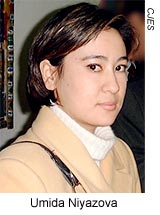New York, February 13, 2007—The Committee to Protect Journalists is alarmed by the January 22 detention of an independent journalist and human rights researcher in Tashkent.
Umida Niyazova covered politics and human rights in Uzbekistan for the Central Asia news Web site Oasis, a project of the Moscow-based media watchdog Center for Journalism in Extreme Situations. She also contributed to Human Rights Watch, Freedom House, and Internews Network, according to CPJ sources.
Niyazova, 32 and a single mother of a 2-year-old-son, was first detained on December 21, 2006, by Tashkent airport police when she arrived from a trip to Bishkek, Kyrgyzstan. Police confiscated her passport and laptop computer, before releasing her the same day. Authorities told her they would screen the computer for “anti-constitutional documents and documents that threaten the [Uzbek] government,” said Andrea Berg, head of the Human Rights Watch office in Tashkent.
Niyazova returned to Bishkek after the incident, where she sought asylum through the UNHCR. Following advice from her lawyer Abror Yusupov, who assured her that authorities had not found anti-constitutional materials on her computer, Niyazova returned to Uzbekistan on January 22, according to CPJ sources in the region.
Authorities arrested Niyazova as she crossed the border into Uzbekistan without a passport, held her incommunicado for four days, and sent her to Tashkent on January 26 where she has been kept in a pre-trial detention center, CJES reported.
The Transport Prosecutor’s Office in Tashkent has charged Niyazova with “illegal border crossing” and “smuggling of subversive literature,” under Uzbekistan’s penal code; each charge carries up to 10 years in prison.
“We call on Uzbek authorities to immediately release Umida Niyazova and to drop the trumped-up charges against her,” CPJ Executive Director Joel Simon said.
Yesterday, CJES revealed that Niyazova has worked for the center since 2000 and has reported for Oasis since 2005 under a pseudonym. “For her safety, we had withheld revealing that Umida worked for us as long as possible,” CJES Director Oleg Panfilov told CPJ. “But under the current circumstances, we decided to make the information public.”
Niyazova wrote critical articles for Oasis about the May 13, 2005, unrest in the northeast city of Andijan, during which security forces opened fire on antigovernment demonstrators, killing between 500 and 1,000 civilians, according to local and international human rights organizations and eyewitness accounts. She also wrote articles that criticized the authoritarian regime of President Islam Karimov.
Following the Andijan bloodshed, Karimov and his regime cracked down on independent journalists and human rights activists, driving independent reporters into exile, putting scores of government critics in jail, and purging the country of alternative news outlets, CPJ research shows.
